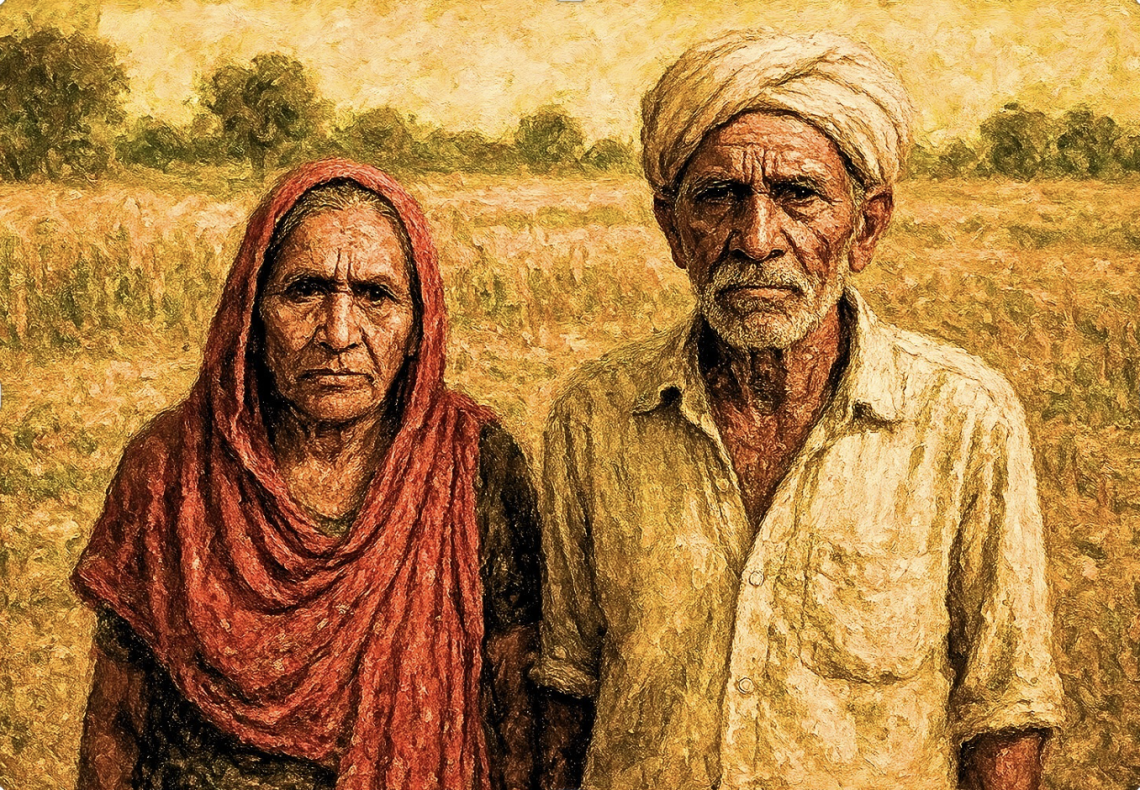Make your 2X MATCHED gift today!
This week only: Every $1 will be matched with $2 to enable women worldwide.
This week only: Every $1 will be matched with $2 to enable women worldwide.
Posted on 11/12/2025

Over 12 months, we interviewed 30 couples to better understand the challenges facing smallholder farmers today. This is the first in a series of blogs based on those interviews. Names and faces have been changed to protect privacy. Photo has been AI generated.
At age 70, Arya has been bedridden for several years with leg pain. Her husband, Arjun, 73, is a retired army officer who spends 3-4 hours a day doing light farm work and tending to their animals. The couple’s adult children have moved away and now support their parents and the family farm. “The sons are very good,” says Arjun, “They don’t indulge in intoxication and have done well in the army.” Arya adds, “Our daughter is very good, well-educated, and has a master’s degree. She is doing coaching in Barabanki; her situation is good.”
One reason for their children’s success may be the couple’s insistence on prioritizing education. “I never stopped the children from going to school,” said Arjun. “Studying is more important for them. Kids were never pulled into the farming activities any time throughout the year.” While Arjun himself completed a post-graduate education, Arya is illiterate, having never attended school. Despite this disparity, Arya says they work on the household budget together, and it is “not difficult at all” to talk to her husband about financial matters.
Arya inherited the farm from her father and grandfather, but, as Arjun describes, all the work is now outsourced. “It all gets done by hired laborers, and you can see how expensive things are. No one really does their own work anymore. Farming is mostly just enough for food and daily use.” The instability of farm life is not ideal, explains Arya. “I have more trust in a job; in a job you get fixed income monthly. In farming income is not fixed because it depends on the harvest. Sometimes the harvest is less and sometimes more.”
Still, the couple has pride in their farm. “We have the resources and whatever we do, we do it right,” Arya says. Her husband adds, “Even if we’re not doing anything ourselves, the fact that it’s there means it can help us in times of difficulty or trouble.”
Although they are in their 70s, Arya and Arjun view women’s inability to work outside the home in their community through a modern lens. Arjun explains, “We have a disease in our community; females do not work (outside the home). In other communities females do a lot of work and they are seen with respect; people praise women that go out and work.” He continues, “It’s good if people’s insight about such women change. People who stereotype, their thinking should change. In every field women should work - in the teaching field, also police, army, bank… everywhere they are working.”
Arya agrees that women should have more opportunities but she sees a double standard between city and village life. “People in the village will gossip if women are going out to work. It is OK if you’re doing something like studying in a hostel - that’s something different - but nobody can work in a village. If a woman will go to a city, only then can she work.” She also cannot see a way around the logistics of both husband and wife working outside the home. “It’s important for a woman to look after her children and in-laws,” she says. “Women can work only if their family supports them; if they won’t, then how will a woman go out?”
In their own lives, the couple accepts their traditional gender roles. “If someone cannot manage a task, it becomes my responsibility,” Arya explains. “Even though I don’t want to, I have to, because, as the guardian of the house, it is necessary.” And Arjun? “I want to make decisions and improve farming,” he says, noting that he feels respected in the FPO they are involved in, but wishes there was better communication and more information available. “If they will call us, then only we will go. They called only once.”
Despite some of the challenges that come with age, the couple remains hopeful. “I live very comfortably,” says Arya. “My sons give me money and I manage my household with that money.” In lean seasons, they save grains or borrow from others, but without sacrificing their health: “We always get medicine immediately when needed,” Kailsha says, with Arjun adding, “We have never been unable to buy medicine due to a lack of money.”
As they observe changes over the decades, Arjun and Arya consider whether things are better or worse than before. “Some things are better, some are worse,” Arjun begins. He describes how families used to stay together but now more children move away to pursue other opportunities. “There is less unity and more focus on money,” he concedes, while recognizing that technology has improved food scarcity; and that education - formerly available only to Brahmins - is now accessible to more people. Arya is a little more cynical: “People were better in the past,” she says. “There used to be a sense of modesty, and people would go wherever they needed to with decorum. Nowadays, everyone is free and there is no discipline.”
At the same time, they both feel strongly supported by both their family and our community, and feel hopeful for the future. “It will go on like this, our family can do and manage like this,” Arya says. “Yes, everything will be done, no problem. With God’s grace, everything is good.”